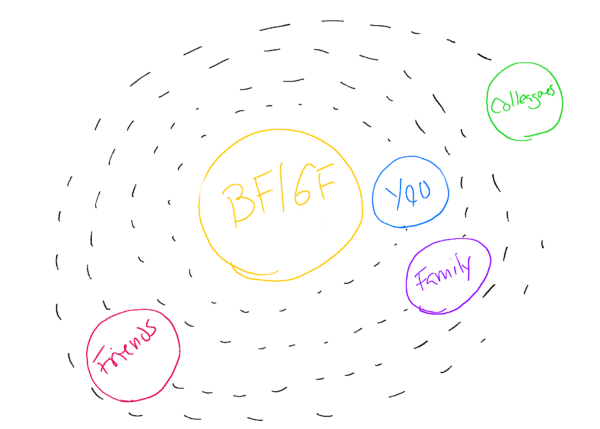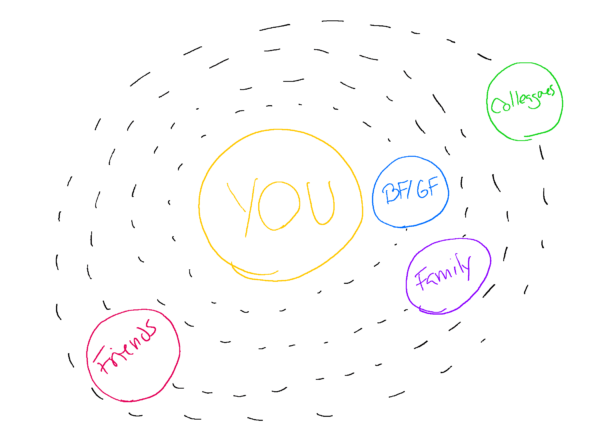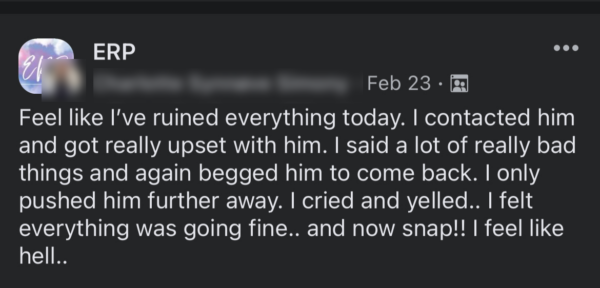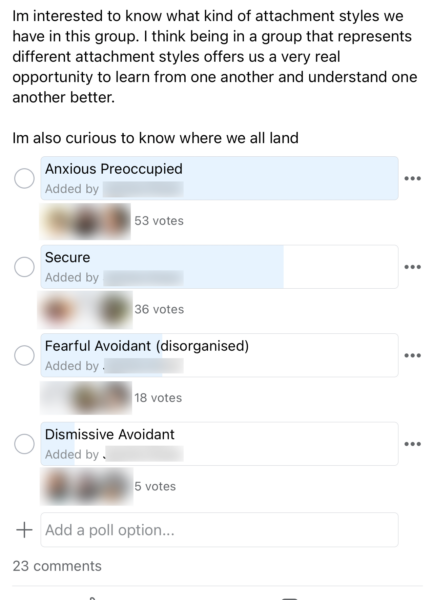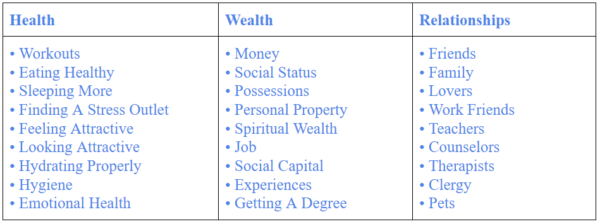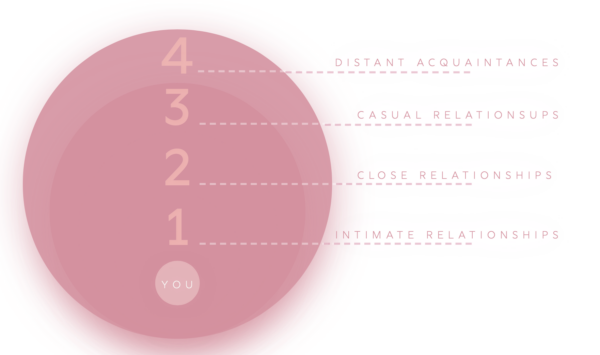Today, we’ll explore the 19 most effective strategies to overcome codependency in your breakup.
Implementing this advice aims to rewire your brain, paving the way for a successful and healthy future relationship.
- Identify Your Triggers
- Give Yourself Time To Grieve
- Engage In Art Therapy
- Implement A No Contact Rule
- Work On Your Boundaries
- Switch Your Focus From Your Relationship To Yourself
- Recognize When You’re Making Excuses
- Integrate Your Trauma
- Identify All Your Addictions
- Focus On Something That Brought You Joy Prior To The Relationship
- Grounding Exercises When You Are Feeling Alone
- Get Quality Sleep
- Work With A Qualified Coach
- Join A Community
- Listen To A Motivation Podcast Every Morning
- Become More Mindful Of Your Thoughts, Wants And Needs
- Become Aware Of Your Hypervigilance
- Find A Therapist That Specializes In Codependence
- Make A Relationship Map
This is an uber long one but before I get to the actual tips I figured it would be prudent to talk about what we’ve seen in our coaching practice.
My Wife And I Believe Most Of Our Clients Are Codependent
A few years ago I got a really cool touchscreen computer that allowed me to draw with one of those digital pens.
The very first graphic I drew was this,
You see, one of the things that I preach to our clients (who mostly want their exes back) is that they need to stop making their whole world about their ex. Rather, they need to become the center of their own world,
What I had created, without even realizing it is perhaps a perfect graphic that described a codependent.
Officially, a codependent person, according to Merriam-Webster, is someone who exhibits a psychological condition or relationship dynamic where they manifest low self-esteem and a strong desire for approval. This leads to an unhealthy attachment to another person, who is often controlling or manipulative. Broadly, codependency involves dependence on the needs of or control by another person.
In more simple terms, someone who is a codependent structures their entire world around someone else and often that “someone else” takes advantage.
Which paves the way for the codependent to have feelings of,
- Grief
- Depression
- Anxiety
- Loneliness
- Shame
And an untrue belief that no-one will ever love them the same way their ex did.
Oh, not to mention they’ll often fall physically ill.
Why Shame Is A Gigantic Reason For Codependency
Codependency can arise from various factors, but perhaps the biggest culprit is shame. Which struck me as odd when I first learned bout it and while it’s not accurate to say that codependency solely comes from shame,
Shame greatly contributes to its development and perpetuation.
Do yourself a favor and watch this,
That whole talk basically argues that
Shame is a deep-seated emotion that arises from feelings of inadequacy, unworthiness, or a belief that one is fundamentally flawed or unlovable. Individuals who experience shame may seek external validation and approval to compensate for their perceived shortcomings. This need for validation can lead to codependent behaviors and relationships.
Shame can contribute to codependency in several ways:
- Core Beliefs: Shame can shape an individual’s core beliefs about themselves, leading them to believe they are unworthy of love and acceptance. This can drive them to seek validation and approval from others, fueling codependent behaviors.
- External Validation: People who experience shame may rely heavily on external validation to feel a sense of self-worth. In codependent relationships, this need for validation can manifest as enabling or caretaking behaviors to gain the approval and validation of others.
- Fear of Rejection: Shame can create a fear of rejection or abandonment. Codependent individuals may go to great lengths to avoid being rejected, leading them to prioritize the needs and desires of others at the expense of their own well-being.
- Boundaries and Identity: Shame can erode a person’s sense of self and make it challenging to establish healthy boundaries. Codependent individuals may struggle to assert their own needs and may define their identity solely through their relationships with others.
I feel this is important to grasp because the 19 tips I’m going to take you through essentially address the main symptoms that shame creates.
But enough talk, let’s get to the good stuff.
Tip #1: Identify Your Triggers
Everyone knows “fight or flight,” right?

What Are Your Chances of Getting Your Ex Boyfriend Back?
Take the quiz(Hey that rhymed.)
The reality is though, that there are four main coping mechanisms,
- Fight:
- Flight
- Freeze
- Fawn
And understanding how codependents cope during a breakup is going to be important for identifying your triggers.
For example,
Codependent Fight: They’ll engage in behaviors that involve confrontation or attempts to control the situation. They might express their frustrations, set boundaries, or try to manipulate others into meeting their needs. This can manifest as nagging, criticizing, or becoming overly controlling. I went to our community and procured a screenshot of what that looks like in real time for you,
Codependent Flight: In this response, codependents may try to avoid or escape from difficult situations or emotions. They may withdraw emotionally, isolate themselves, or engage in activities that distract them from the stressors. Avoidance behaviors can include excessive busyness, overworking, substance abuse, or escaping through various forms of entertainment.
Codependent Freeze: The freeze response involves a state of emotional and psychological shutdown. Codependents may feel overwhelmed or helpless, leading them to emotionally detach or dissociate from the situation. They may become emotionally numb, go into denial, or disengage from relationships altogether.
Codependent Fawn: As a codependent, the “fawn” response is often exhibited due to a fear of losing their ex-partner permanently. For instance, even when no longer together, a codependent person may go to great lengths to fulfill a favor asked by their ex, illustrating a typical fawning behavior. For further insights into such patterns of codependency, particularly in women, the book “Why Women Love Too Much” by Robin Norwood is worth a read.
But how the heck do these coping mechanisms connect to identifying a trigger?
Well, you can sort of work the coping mechanism backwards to understand what the trigger is. Look, I’ve been doing this a long time and often when I inform someone that they have anxious attachment style tendencies (which most codependents do) most people are in shock.
Yet, the statistics bear this out,
Most are in denial about it.
This is because they have a hard time identifying their attachment styles.
Codependents are the same with their triggers. They often have difficulty identifying what triggers their coping mechanisms. However, if we can reverse engineer the process it gives us a template for employing a redirection strategy.
I’ll give you a real example,
Let’s say you are in a store and you smell your exes cologne. This prompts you to leave the store thinking that he might be in there.
- The Trigger would be the cologne
- Leaving the store would be the flight response.
By looking at the flight response you can literally reverse engineer and identify it was the trigger that made you have this crazy reaction.
Of course, when you’ve identified the trigger the question quickly becomes, how do you handle it?
Well, the way to improve your automatic responses would be to use reframing.
Internally you would say that sure, the cologne smells like my ex but 20,000 bottles of that cologne are sold every year so it’s unlikely it’s him.
Let’s move on.
Tip #2: Give Yourself Time To Grieve
In my line of work people are constantly asking,

What Are Your Chances of Getting Your Ex Boyfriend Back?
Take the quizWhat’s the main difference between men and women after a breakup.
Honestly, I always fall back on this study by Binghamton University,
Which found that women tend to hurt more after a breakup but recover more fully.
My argument is simple. Because women are so great at emotional expression and men are taught to suppress emotions this means they let their grief out after a breakup whereas men bottle it up inside where it builds and builds like a volcano.
So yes, allowing yourself time to grieve after a breakup is important.
My single best piece of advice here is to set a 15 minute timer each day to feel your feelings and when I say “feel your feelings” I really mean feel them.
- Cry
- Reminisce
- Grieve
You are allowed to do whatever feels natural in that span of time. However, when that time goes off it’s time for you to put that aside and more on with your day.
Tip #3: Try Art Therapy
This one doesn’t sound like me, does it?
That’s because it’s not. It’s directly from my wife who helped me outline this article.
So, what’s the big deal with art therapy?
Well, it provides an Alternative Reward System.
When you hyperfocus on your ex, sometimes it’s impossible to turn that part of your brain off. Luckily, Engaging in art can provide a healthier alternative by activating the brain’s reward pathways through the process of creating and completing artwork.
This can help individuals experience a sense of fulfillment and pleasure.
And to back this up further, in this article I talk about a concept called the breakup triad strategy which has been proven by studies to be the most effective way of handling a breakup,
- Re-appraise ex (think about all the negative ways they treated you)
- Accept circumstances (accept you are broken up and be ok with it)
- Distract yourself (Do I really need to say anything here?)
This tip argues that perhaps the very best “distraction” there is, is engaging in art therapy.
Tip #4: Implement The No Contact Rule
The no contact rule is something that we are pretty famous for here at Ex Boyfriend Recovery but what I truly thinks separate us from our peers when it comes to the no contact rule is how we teach it.
If you aren’t familiar our official definition of the no contact rule is as follows,
The no contact rule refers to a period of time where you cut off all conceivable communication with an ex after a breakup. The intent of this tactic should NOT be used to make your ex miss you but instead should be used to rebuild your own life so that you outgrow your ex. By doing this, the no contact rule can have the added benefit of making an ex miss you
It’s that “outgrowing part” that really is the important part.
But what does outgrowing your ex during a no contact rule actually look like?
Well, check out this success story interview with one of our clients,
What I like about no contact, specifically for those who are co-dependents is it allows you to address the following things,
- Breaks the Cycle of Dependency: Codependents often rely heavily on another person for their self-esteem and validation. The “No Contact” rule can help break this cycle, allowing the codependent person to start relying on themselves rather than someone else.
- Allows for Self-Reflection and Healing: By removing the other person from their life temporarily, the codependent person has the space and time to reflect on their own needs and desires. This can be a crucial step in healing and recovery.
- Establishes Boundaries: Codependents often struggle with setting and maintaining boundaries (We’re going to talk about this really soon.) The “No Contact” rule is a clear boundary that can help protect the codependent person from further emotional harm.
- Prevents Manipulation: If the other person in the relationship is manipulative or abusive, the “No Contact” rule can help protect the codependent person from further manipulation or abuse.
- Promotes Independence: By cutting off contact, the codependent person is forced to navigate their life without relying on the other person. This can help foster independence and self-reliance.
Of course, the big question when it comes to no contact always seems to revolve around how long your no contact rule should be.

What Are Your Chances of Getting Your Ex Boyfriend Back?
Take the quizI’ve had many discussion about this in the past,
And typically you see me talk about three time frames.
- The 21 Day Rule
- The 30 Day Rule
- The 45 Day Rule
For codependents I feel like it’s best to implement a 45 day rule because it gives you more time to outgrow your ex (and for some that might not even be enough.)
Tip #5: Work On Your Boundaries
As stated above, codependents struggle mightily with boundaries.
I’m actually going to quote from one of the best books on the topic of boundaries called “Set Boundaries And Find Peace”
There are really three levels of boundaries,
- Porous: These are poor and weak boundaries that often lead to feelings of depression and anxiety, as well as overextension of oneself. They can result in unhealthy relationships characterized by oversharing, codependency, enmeshment, and people-pleasing. Additionally, they may involve a lack of emotional separation between yourself and another person, the expectation of mistreatment, and an inability to say no.
- Rigid: These boundaries are built like walls to keep oneself safe, particularly if there’s a history of being taken advantage of. Characteristics include never sharing personal feelings or experiences, enforcing strict rules, avoiding vulnerability, having high expectations of others, cutting people out, and harshly saying no.
- Healthy: With healthy boundaries, your past doesn’t dictate your present. This involves being clear about your values, listening to your own opinions, and being comfortable with saying no. It also means allowing healthy vulnerability with people you can trust, accepting a ‘no’ from others without taking it personally, and offering financial support to others when you can do so without hurting yourself financially.
Similar to attachment theory in how the goal of attachment styles is to always take an insecure attachment and turn it into a secure attachment. The goal of these three levels of boundaries is to take either a porous or rigid boundary and turn them into a healthy one.
But how?
Well, follow this formula
Communication + Action = Healthy Boundary
I’ll give you a few examples on how to communicate your needs clearly,
Let’s say that you and your ex have gotten into disagreements in the past and sometimes these disagreements have grown heated.
You would communicate your needs clearly:
“When we have a disagreement I’d like you to use a lower tone and take a break if you feel like you’re getting too heated in the argument. I will also let you know when I’m becoming uncomfortable with your tone.”
Then, if your ex doesn’t comply you should remove yourself from the situation which would be the action.
Here’s another example,
Let’s say that your partner is constantly cancelling dates on you at the last minute.
You would communicate your needs effectively,
“It’s important to me that you honor plans that we set up. If you need to change plans I’d like you to sent me a text a few hours beforehand.”
If they don’t comply you give them a legitimate consequence, you no longer invest your time into them.
THIS is a healthy boundary.
Tip #6: Switch Your Focus From Relationships To The Relationship With Yourself
Now, this really goes back to what I was talking about a little bit earlier in the article with that graphic that I drew.
You know, I always like to view relationships and our lives sort of as solar systems.
At the center of a solar system, you have a sun, and then the planets revolve around the sun.
But a lot of times, with codependence, what I see happening is they are a planet in someone else’s solar system. And really, that’s because their focus is too much on relationships, as opposed to the relationship with themselves.
So, one of the things that I’m constantly telling our clients—people who have been broken up with, people who are completely codependent on their exes and don’t know how to live without them—is to find something that they care about just as much as their ex and focus on that.
Now, notice I said find something that you care about just as much as your ex, not find someone that you care just as much about as your ex.
And that’s the key.
It’s about providing not only value to the world but value for yourself.
So, you’ll often hear me talk on Ex Boyfriend Recovery about this concept called the Magnum Opus—your life’s work.
What do you want to be remembered for when you pass away?
And if your answer to this is, ‘I want to be remembered for my relationship with this person,’ you do not have a Magnum Opus; you have a codependent relationship.
The best way, in my opinion, to switch your focus from relationships with your ex to the relationship with yourself is to find something else that you can really get passionate about.
And the way I’ve always tried to explain this concept is by trying to find the intersection between all three areas of the Holy Trinity.
So, I talk a lot about the Holy Trinity:
You basically divide your life into these three areas and start working on ways to synergize and ensure that you’re maximizing your life in these areas.
Well, the Magnum Opus will be one thing that you can dedicate your time to that will positively impact all three areas.
As an example, for me, I’m a writer.
I enjoy writing books because they have the potential to generate income.
Additionally, the process of writing a book introduces me to various interesting individuals who assist me along the way.
I rely on editors, artists for cover designs and graphics, and storyboard artists for specific tasks. Through these collaborations, I’ve had the pleasure of meeting some of the most remarkable people in my life, thus fostering positive relationships.
Moreover, writing serves as a form of therapy for me, positively impacting my mental health.
Therefore, pursuing this as a Magnum Opus aligns with all three aspects of the Trinity.
- Health is covered
- Wealth is covered
- Relationships is covered
For those struggling with codependency, my recommendation is to discover an external passion that you can genuinely love.
Tip #7: Recognize When You Are Making Excuses
This tip is similar to one of the earlier ones, which involves identifying your triggers.
However, in this case, it’s about identifying the excuses you make.
Many of our clients, who often have anxious attachment styles,
Are not aware of the excuses or narratives they tell themselves that hinder their progress.
You can usually tell that you’re making an excuse when you engage in denial or blaming to protect the relationship.
Codependents often resort to this behavior out of fear that their partner will leave them, which aligns with the core wound of an anxious individual—fear of abandonment.
If their ex leaves them, their core fear becomes a reality.
To salvage the relationship, they begin making excuses, denying their own role, or even blaming themselves.
Anxious individuals possess problem-solving skills, which can be one of their greatest assets.
When something goes wrong, they immediately try to find a solution to make themselves feel better. However, this approach can sometimes be counterproductive.
While problem-solving is a valuable skill, it becomes problematic when the narrative involves blaming yourself or denying the mistakes made, either by yourself or your ex-partner. It’s important to be honest with yourself, even if it means having difficult conversations.
Learning to recognize when you’re making excuses can be challenging, but it’s crucial for personal growth.
Tip #8: Integrate Your Trauma
The first step is recognizing and accepting that your trauma has occurred.
Next, consider how it impacts your current life.
We’ve observed a clear downward spiral among our clients who go through breakups, particularly those with an anxious attachment style (of which most our clients are.)
For individuals with this attachment style, losing their partner is often seen as the worst thing that can happen, and it can consume their entire lives.
There’s certainly a comparison to be made with the synergy between the Holy Trinity, where negative impacts on relationships can also affect wealth and health.
This is how trauma can bleed into your current life.
One of the most beneficial actions you can take is to read books that help you identify and understand your trauma, so you don’t blame yourself for what has happened.
When discussing the integration of trauma, I also refer to Carl Jung’s concept of integrating your shadow.
Jung argued that each of us has a shadow self, and we often put up facades to deny its existence.
However, achieving transcendence involves accepting and integrating our shadow, acknowledging our mistakes and embracing the darker aspects of ourselves.
This process is part of integrating your trauma and learning to be kinder to yourself, reducing self-blame for past relationship experiences.
It’s essential to recognize that most of the time, the faults in the relationship are not solely your own.
One highly recommended book on this topic is ‘How to Do the Work’ by Dr. Nicole LaPere. I suggest starting with this book as it provides valuable insights on integrating your trauma and moving forward.
Tip #9: Identify Your Addictions
The term codependency originally referred to dependency on drugs but has since expanded to include other addictive behaviors.
It’s funny, when we examine the brain of someone going through a breakup, we find that the same part of the brain activated during drug withdrawal is triggered in this situation.
The feelings, emotions, struggles, and addiction-like experiences you face after a breakup are similar to going through withdrawal from drugs.
Considering the concept of synergy and how the choices we make can impact the Holy Trinity, it’s important to recognize that there is also synergy among addictions.
Sometimes we turn to addictions as coping mechanisms, but they may not be healthy for us.
We can become overly reliant on other people, food, drugs, social media, sex, gaming, work, shopping, exercising, or dieting.
The key is to identify both the healthy and unhealthy addictions.
For example, exercising or dieting can be incredibly healthy ways to improve your well-being. Whereas drinking, drugs and meaningless sex is not considered healthy.
So, in a lot of ways it’s about redirection. It’s about identifying the addictions that hinder your progress and focusing your energy on those that contribute to your growth.
Tip #10: Focus On Something That Brought You Joy Before The Relationship
In our community, we have Trinity check-ins facilitated by my wife, where people share positive aspects of their lives and progress in the Holy Trinity.
Here’s a real example:
For health this individual is,
- exercising
- exploring an interest in West Coast Swing
- has recognized and addressed an unhealthy addiction to Instagram.
They are also working on wealth goals,
- designing a business,
- planning a social enterprise project,
- and studying for a Japanese language test.
And for relationships they are,
- Dating other people
- Sending the money owed to the ex
But its really the health and wealth where they shine in my opinion. By engaging in activities that previously brought joy, they are shifting their focus from the relationship with their ex to their relationship with themselves.
This approach aligns with the search for a magnum opus.
Sometimes we have already found our magnum opus before entering a relationship, but as codependents, we can lose ourselves in the reliance on the relationship with our ex.
By reflecting on what brought us happiness before the relationship and finding an intersection with the Holy Trinity, we can discover our magnum opus.
Tip #11: Grounding Exercises
Personally, I’m not great at this myself. I tend to live either in the past or the future, but the key is to stay present, to live in the moment, and stop hyper-focusing on your ex or the relationship.
Some of the best grounding exercises include:
- repeating positive affirmations to yourself
- taking slow deep breaths
- doing something meditative like splashing water on your face
- or enjoying a refreshing drink.
- You can even hold a cold can or bottle in your hands to help ground yourself.
Many people in our community struggle with this because instead of being present in the moment and reassessing their current situation, they’re constantly dwelling on the past, thinking about what they’ve lost or what their ex is up to.
But these thoughts and behaviors are unhealthy.
It’s crucial to try to live in the present and engage in activities that help you ground yourself.
Tip #12: Get Quality Sleep
I think it’s pretty obvious that sleep deprivation messes with your mood.
I’ve written about this extensively, and let me tell you, I don’t function well without getting at least seven to eight hours of sleep every night.
In fact, eight hours is the golden number you should aim for consistently.
When you don’t get enough sleep, it can lead to a whole range of negative outcomes.
I came across some information from the Cleveland Clinic that sheds light on what happens when you’re sleep-deprived.
In the short term,
- You experience a lack of alertness and excessive daytime sleepiness.
- You’ll feel sluggish and struggle to stay awake after a night of insufficient sleep.
- It can also impact your memory and increase relationship stress, making you moody and more likely to have conflicts with others.
- Your overall quality of life takes a hit.
- And there’s even a greater risk of car accidents.
But let’s talk about the long-term problems.
Chronic sleep deprivation can lead to serious issues like;
- high blood pressure
- diabetes
- heart attack
- heart failure
- and stroke.
- It can also contribute to obesity
- depression
- weakened immune system
- and lower sex drive.
Not getting enough sleep isn’t just a short-term inconvenience; it can actually have long-term health consequences and even shorten your lifespan.
So, one of the best things you can do to cope with your breakup is to prioritize getting enough sleep.
Trust me, it’s a game-changer. Just by improving your sleep, you’ll reduce relationship stress, stabilize your mood, and make more rational decisions instead of being overly emotional.
Tip #13: Work With One Of Our Coaches
Now, I’ll be honest with you—I’m probably the worst salesman ever.
Yes, we have a coaching practice, and yes, we specialize in helping codependent individuals become less dependent on their exes.
But here’s the thing, I don’t believe you necessarily have to coach with us specifically.
What’s most important is finding the right coach for you.
For instance, our expertise lies in helping codependent people heal from breakups. Sometimes that means getting your ex back, and sometimes it means moving on from your ex.
That’s our specialty.
We also assist individuals in relationships and marriages, so we have those skills too.
However, if you’re seeking a certified coach, it’s crucial to ensure that the coach isn’t solely focused on getting your ex back.
If that’s their main priority, they might not be the right fit for you.
I understand it may sound a bit hypocritical since our coaching page mentions winning your ex back, but at the core of what we teach, it’s not solely about that.
It’s about helping you rediscover yourself, and as a result, that often makes your ex more likely to come back.
If a coach doesn’t have that frame of reference or mindset, they may not truly address or help resolve the underlying issue of codependency.
So choose a coach wisely, someone who genuinely aims to support and solve the challenges you’re facing.
Moving on to tip number fourteen,
Tip #14: Join A Community
Now, I’ll be straightforward here—this is where I do my little pitch for the ex-boyfriend recovery community.
Without a doubt I consider it to be the most valuable things I’ve ever created.
There are several reasons why it’s valuable, but the ultimate game-changer is the accountability factor.
Our community offers three layers of accountability.
Yes, the community serves as a space for people going through breakups to vent, seek advice, and receive support in various aspects of their lives. What makes it work so well is the presence of social accountability, which I like to think of as layers or tiers of a cake.
- Peer to peer accountability
- Veteran member accountability
- Expert accountability
The first layer is peer-to-peer accountability.
You’re paired with individuals who are also experiencing similar situations, and together, you hold each other accountable. When you feel tempted to break the no-contact rule, they step in and remind you to focus on yourself instead.
Then there’s veteran member accountability.
We have members who have been part of the community for years, and it’s pretty amazing to think about the success and longevity we’ve achieved. These experienced members can offer support and accountability because they’ve been through it before. Peer-to-peer accountability is fantastic, but sometimes what we need is evidence.
We need to hear from someone who says, ‘Hey, I was where you are a couple of years ago, and I promise there’s light at the end of the tunnel.’
And lastly, we have expert accountability.
Coaches like us jump in to provide guidance and hold you accountable, steering you toward the right path. Having these three layers of accountability can greatly assist you in overcoming your codependent tendencies.
Tip #15: Listen To A Motivational Podcast Every Morning
Personally, I enjoy listening to interviews with David Goggins.
He’s just awesome! But I understand that his advice might not resonate with everyone since it’s best suited for those who thrive on grinding, embracing challenges, and accomplishing things through sheer determination.
Now, here’s a bit of a quirky recommendation that works for me.
The other day, I was working out, and believe it or not, my knee is in pretty bad shape, so I can’t run anymore.
However, I can cycle on a stationary bike. So, while I’m on the bike, I prop up my phone and listen to stuff on YouTube to make the workout less monotonous. I stumbled upon a YouTube channel called GraveMind, which may seem strange, but it combines motivational speeches with awesome music and anime visuals.
I’ve always had a soft spot for anime, and I find that as I watch these videos, I get incredibly inspired.
It feels like everything is going to be okay, even if it’s just for a moment.
Life tends to bombard us with worries and fears, so starting your day with a motivational podcast or video can help establish a healthy habit. Listen to it at the same time while doing something that positively impacts you.
For me, it’s during my workout, and it works wonders.
Tip #16: Be More Mindful About Your Thoughts, Wants, Needs And Things You Enjoy
It’s essential to reconnect with yourself since codependents often abandon their own interests to please others, including their exes.
After a breakup, codependents often find themselves trapped in a cycle, moving from one relationship to the next without truly learning and losing themselves along the way.
That’s why it’s crucial to take a step back during this time and figure out what you genuinely enjoy in life.
Your pursuit of the magnum opus can assist you in this process. Find your own interest—something that personally ignites your passion.
It’s okay if it seems silly or unconventional, like my love for anime.
That’s what makes me who I am.
I love that sh*t… my wife hates it, and that’s perfectly fine.
Neither of us is codependent.
While we do rely on each other, we also maintain our individuality.
We are a team, that knows we can survive without the other if it came down to it and that’s how a healthy relationship should look, at least in my opinion.
It’s what has worked for us.
Tip #17: Become Aware Of Your Hypervigilance
Tip number seventeen is to become aware of hyper vigilance and the importance of your distress tolerance skills.
As a codependent, you may have struggled to regulate your emotions as a child because your caregivers didn’t co-regulate with you or allow you to express your feelings.
Hypervigilance, if you’re not familiar with the term, is essentially being in a constant state of assessing potential threats around you.
It often stems from trauma, and it’s easy to allow this pattern to define and shape your thoughts, especially when it comes to relationships.
Many hyper vigilant individuals have built walls around themselves due to negative past experiences, leading to a constant state of heightened awareness where they may struggle to trust others.
The recommendation here is to be more mindful of when this hypervigilance is happening so that it doesn’t hinder your ability to enjoy life or neglect important aspects of yourself.
There isn’t much more to delve into here—just focus on becoming more aware of it.
Tip #18: Find A Therapist Who Specializes In Codependency
Just like finding the right coach, it’s crucial to seek a therapist who aligns with your specific needs and can effectively address your codependency.
Some therapeutic approaches that have shown to be helpful include:
- Cognitive Behavioral Therapy (CBT)
- Dialectical Behavior Therapy (DBT)
- Inner child work
- Somatic therapies
- Jungian shadow work
- Internal Family Systems (IFS)
- Psychodynamics
- Schema therapy
- Group therapy
- Family therapy
Of course, you don’t have to try all of these therapies.
Choose the one that resonates best with you.
While I could explain each of these in detail, I believe you’ll benefit more from researching them yourself and selecting the approach that suits you best.
Tip #19: Create A Relationship Map
This is somewhat similar to the graphic I have on this website revolving around the sphere of influence,
But with the relationship map, you’re assessing the relationships in your life.
- Start by placing yourself in the center of the map and identify the people closest to you emotionally.
- Assign each person a rating between 1 and 10.
- Then, expand the map to include people who are more distant and ask yourself what you can do to bring those you’d like to improve relationships with closer to the center.
Here’s the key: your ex should not be the closest person to you on this map.
